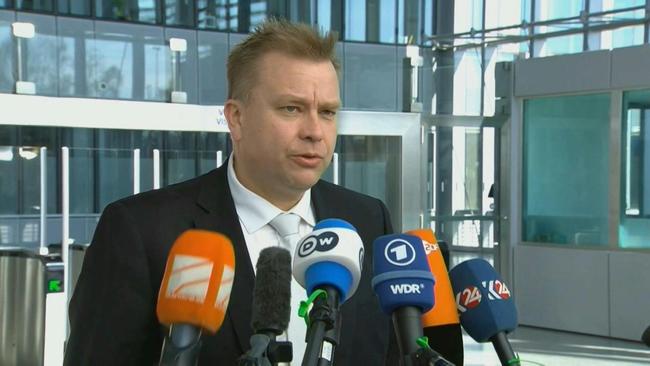Finland joins NATO in historic shift sparked by Russia's war
Finland joins NATO in historic shift sparked by Russia's war

Finland's blue-and-white Nordic cross flag was hoisted outside NATO headquarters on Tuesday as it became the alliance's 31st member, in a historic realignment of Europe's defences spurred by Russia's war on Ukraine.
NATO leaders will now turn up the pressure on their awkward allies Hungary and Turkey to lift their block on Sweden joining.
Helsinki's strategic shift -- which ended decades of military non-alignment -- has doubled the length of the US-led alliance's land border with Russia and drew an angry warning of "countermeasures" from the Kremlin.
Finland's foreign minister formally sealed Helsinki's membership by depositing the accession papers before the Finnish flag was raised between those of France and Estonia to the singing of a choir outside NATO's gleaming Brussels headquarters.
"Finland now has the strongest friends and allies in the world," NATO chief Jens Stoltenberg said.
Russian President Vladimir Putin, he said, had "wanted to slam NATO's door shut. Today we show the world that he failed, that aggression and intimidation do not work".
Joining NATO puts Finland under the alliance's Article Five, the collective defence pledge that an attack on one member "shall be considered an attack against them all".
This was the guarantee Finnish leaders decided they needed as they watched Putin's devastating assault on Ukraine.
"NATO membership strengthens our international position and room for manoeuvre," Finland's President Sauli Niinisto said.
US President Joe Biden said the alliance was strengthened by its newest member and promised to "defend every inch of NATO territory".
But Moscow erupted in fury at the move, which takes its frontier with NATO member states to 2,500 kilometres (1,550 miles), branding it an "assault" on Russia's security and national interests.
"This forces us to take countermeasures... in tactical and strategic terms," Kremlin spokesman Dmitry Peskov said.
- Powerful military -
Invaded by its giant neighbour, the Soviet Union, in 1939, Finland -- which has a 1,300-kilometre border with Russia -- stayed out of NATO throughout the Cold War.
Now its membership brings a potent military into the alliance with a wartime strength of 280,000 and one of Europe's largest artillery arsenals.
Its strategic location bolsters NATO's defences on a border running from the vulnerable Baltic states to the increasingly competitive Arctic.
Senior NATO military commander Admiral Rob Bauer told AFP that Finland had so far not requested its new allies station troops on its soil.
NATO officials say the war in Ukraine has sapped Moscow's forces, but the alliance is monitoring how Russia responds to gauge its future steps.
Turkey and Hungary, attempting to gain leverage over allies in separate political battles, had delayed Finland's bid to come under the NATO umbrella -- and Stockholm's progress remains blocked.
But last week, the Turkish parliament voted to clear Finland's final hurdle.
Completing the ratification in well under a year still makes this the fastest membership process in the alliance's recent history.
NATO was created as a counterweight to the Soviet Union at the onset of the Cold War era that began immediately after the Allies defeated Nazi Germany.
- Sweden soon? -
Finland's arrival nevertheless remains a bittersweet moment for the alliance as the hope had been for Sweden to come on board at the same time.
Helsinki's first act as a new member was to back Stockholm's bid.
Budapest and Ankara remain the holdouts after belatedly agreeing to wave through Helsinki's bid.
Sweden has upset Hungary's leader Viktor Orban -- one of Putin's closest allies in Europe -- by expressing alarm over the rule of law in Hungary.
It has also angered Turkey by refusing to extradite dozens of suspects that President Recep Tayyip Erdogan links to a failed 2016 coup attempt and the decades-long Kurdish independence struggle.
The United States and other NATO members led the calls for Sweden to join as soon as Finland's flag was fluttering in the cold Brussels breeze.
German Chancellor Olaf Scholz said he believed both countries would take part in a NATO summit in Vilnius this summer as new members.
Ukraine is also pushing for eventual NATO membership, but Western diplomats say that remains a distant prospect.
"There is no better strategic solution to ensuring strategic security in the Euro-Atlantic region than the membership of Ukraine in the alliance," Ukraine's Foreign Minister Dmytro Kuleba said.
Stoltenberg said Ukrainian President Volodymyr Zelensky was invited to NATO's Vilnius summit in July.
The focus for the alliance remains on bolstering Kyiv's capacities to win the war, while moving it towards NATO membership only over the longer term.
bur-imm/pvh


